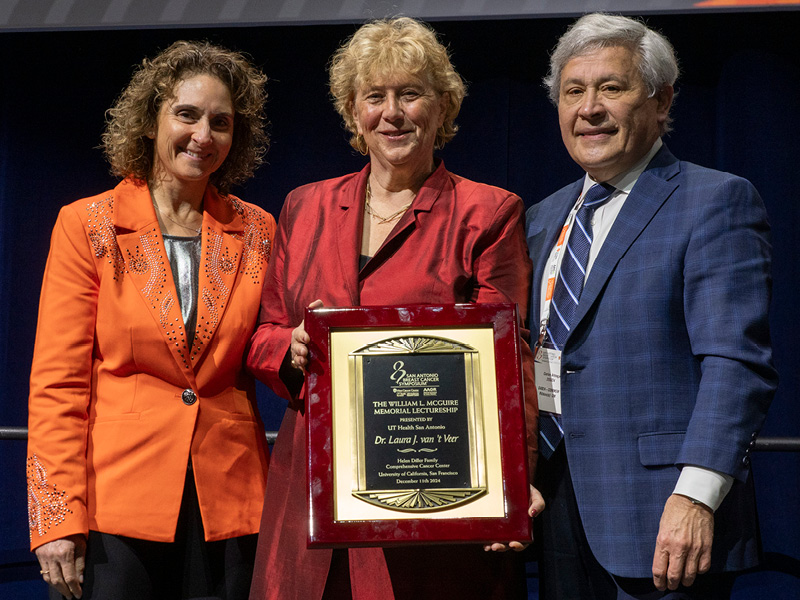The San Antonio Breast Cancer Symposium® presented Laura J. van ‘t Veer, PhD, with the 2024 William L. McGuire Memorial Lecture Award on Wednesday, December 11, in recognition of her pioneering work in advancing risk stratification, subtyping, and improving treatment for early breast cancer.
Dr. van ‘t Veer is a Professor of Laboratory Medicine and Angela and Shu Kai Chan Endowed Chair in Cancer Research in the Department of Laboratory Medicine at the University of California, San Francisco (UCSF). She is also Director of Applied Genomics and Leader of the Breast Oncology Program for the UCSF Helen Diller Family Comprehensive Cancer Center.
During her address to SABCS® attendees, Dr. van ‘t Veer discussed several career milestones, including the invention of the 70-gene MammaPrint lab test that is used to help predict the likelihood of breast cancer recurrence and the chance for metastasis. The lecture will be available on demand for registered 2024 SABCS® participants through March 31, 2025.
“When disease is localized, it is mostly curable, but when it’s generalized elsewhere in the body, it’s very difficult to cure. There are medical therapies that prevent recurrence, but there’s risk of overtreatment, undertreatment, and suboptimal treatment,” Dr. van ‘t Veer said.
“We discovered that 70 genes expressed in the primary breast tumor could distinguish high-risk from low-risk recurrence tumors,” she continued. “Those patients with a good signature may have a low need for chemotherapy and those with a poor signature, a high need for chemotherapy.”
Findings from the MINDACT trial demonstrated that fewer than 5% of patients with clinically high-risk but genomically low-risk (as determined by the MammaPrint test) breast cancer who did not undergo chemotherapy experienced distant metastasis within five years, outcomes that were similar to those who did have chemotherapy. These results suggested that MammaPrint could identify additional patients who can safely forgo chemotherapy. More recent clinical trial data presented by Dr. van ‘t Veer showed that MammaPrint could also help stratify patients for extended endocrine therapy. Today, the MammaPrint test is included in numerous treatment guidelines.
Dr. van ‘t Veer’s contributions also include her ongoing leadership role in the landmark I-SPY trials and the development of the scientific platform for the nationwide I-SPY 2 trial, which is investigating the potential of personalized treatments based on breast cancer biomarker subtypes.
Her research efforts since the first I-SPY trials were launched led to the development of a valuable biomarker bank containing clinically annotated tissue and blood samples from high-risk patients with early-stage breast cancer.
Dr. van ’t Veer and colleagues subsequently described five response-predictive subtypes based on several novel gene expression signatures. These helped improve the ability to predict which patients would benefit the most from specific therapies, such as immunotherapies.
“Immuno-oncology agents carry a risk of immune-related toxicities, some very serious. They are rare, but they are non-reversible, so we want to understand who really benefits from these drugs and who maybe could be better treated by another treatment,” she said.
The predictive value of the response-predictive subtypes Dr. van ‘t Veer and colleagues described is currently being tested in the next generation of I-SPY trials, I-SPY 2.2.
“I-SPY 2.2 uses a sequential multiple assignment randomized trial, or SMART, design and the goal is to maximize the chance of reaching pCR (pathological complete response) for each patient and avoid overtreatment,” Dr. van ‘t Veer said.
Access the 2024 SABCS® virtual platform
Watch any sessions you’ve missed and stay connected with fellow attendees in the online platform of the 2024 San Antonio Breast Cancer Symposium®. Recordings of sessions will be available on demand for registered 2024 SABCS® participants until March 31, 2025.


